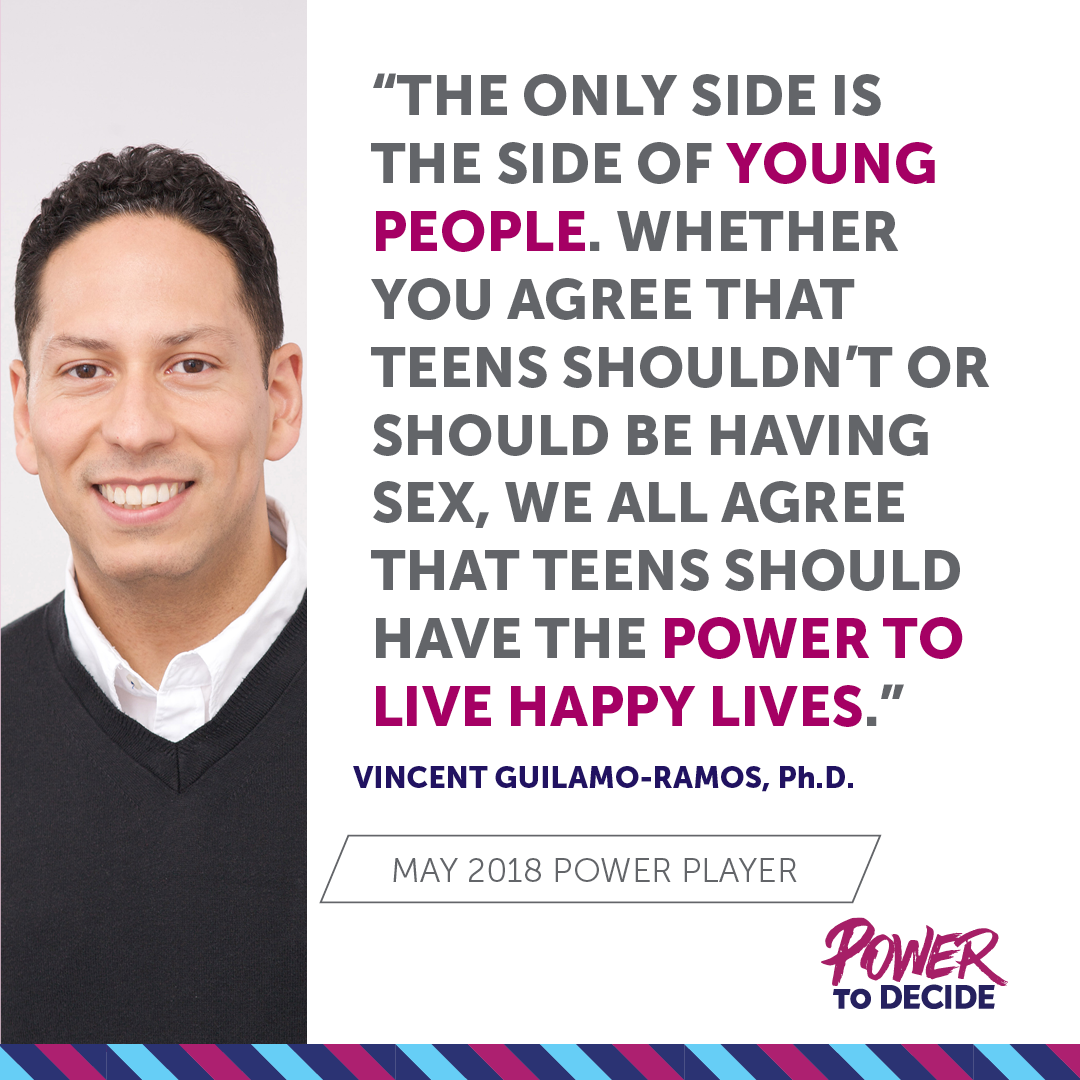May 2018 Power Player
Here at Power to Decide, we are committed to uplifting the many individuals who are on the ground doing the work that matters most. Each month we'll highlight an individual or organization who is championing the effort to give young people the power to decide if, when, and under what circumstances to get pregnant. Check out this month's Power Player profile.
Vincent Guilamo-Ramos
NYU Director of The Center for Latino Adolescent and Family Health Adolescent AIDS Program, Montefiore Medical Center
Q1: What work have you done to ensure that young people have access to high-quality sexual health information or high-quality contraceptive services so that they can decide if, when, and under what circumstances to get pregnant?
A1: The work that I’ve done for roughly 20 years has been focused on supporting parents and encouraging them to have effective conversations with their children around reproductive health. When you look at things like timing, content, and the frequency with which parents should be talking about things like sex, love, and relationships—it gets tricky. Through my work, I’ve tried to create programs that translate into a number of settings. Families Talking Together is one of those programs. It has proven that when parents communicate, young people make better decisions about their health.
Most recently, we’ve really been focused on fathers and sons and the role that conversations around sex, love, and relationships play in delaying pregnancy and empowering young people to achieve the futures they envision.
Lastly, I work as a nurse practitioner specializing in adolescent health. I have the honor of providing primary care to adolescents at risk or living with HIV. In this role, I have the opportunity to remain “grounded” in what adolescents perceive as being their sexual and reproductive health needs.
Q2: How did you get started in your field? What is your driving force?
A2: I got started in this field by working with young people in the early ‘90s. I was working with adolescents at risk for HIV, STIs and unplanned pregnancies make decisions that would impact their lives, long-term. I realized young people were making decisions to have sex that were resulting in negative outcomes.
Also, at that time Latina girls were 50% more likely to become pregnant before the age of 20. There were very few organizations focused on these issues, who saw these issues as a public health concern. These teens were lacking guidance and champions to help influence their decisions and choices.
As a country, we’ve made a number of investments to improve the lives of young people, and in some ways, those investments have paid off. However, there are other areas where we’re still lacking. For example, young people of color are still being infected with STDs and STIs at a much higher rate than ever before.
This continues to be my driving force. I have to continue to work towards addressing these historical inequities.
Q3: What advice would you give to someone looking to effect change in the field that you currently work in?
A3: The advice that I would give to others is to focus on the science and evidence of what works for young people. There are a lot of opinions about young people having sex, but we need to remember that the majority of young people have sex later in their adolescence. We should also embrace and celebrate that parents and family members continue to be the largest influence in young people’s lives.
Don’t pick a side. The only side is the side of young people. We need to support all types of families and help them to help their young people. Whenever I encounter opposition, I try to stick to the common ground. Whether you agree that teens shouldn’t or should be having sex, we all agree that teens should have the power to live happy lives. So, I advise that we continue to create resources that work toward that.
Q4: Why should someone care about ensuring that all people—regardless of who they are or where they live—have access to the information and contraception they need to live their best life story?
A4: I have two arguments for why young people should be a priority:
- Young people make decisions during their adolescence that set the stage for their long-term health and well-being. Few people realize that 70% of premature adult deaths are a result of adolescent lifestyle choices and exposures. We fail to realize that decisions made during adolescent years impact young people in the long run.
- If young people aren’t supported to be the most productive individuals and aren’t engaged at the highest level, we miss out on their potential. We miss out on them contributing to the overall well-being of our nation and economic well-being of our society.
Q5: Is there a highlight about your work in conjunction with our organization that you’d like to share?
A5: There a number of highlights I’ve had the pleasure of sharing with Power to Decide. I’m a Board Member and a friend of the organization and have been for 15 years. I’ve had the opportunity to work with Power to Decide to build the amazing program, Families Talking Together, which continues to thrive.
*Responses have been edited for clarity



